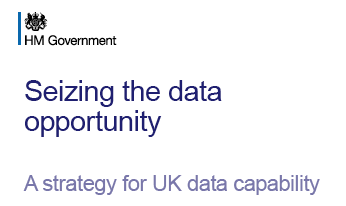The data opportunity
 The recently published government report entitled "Seizing the data opportunity" lays out a wide ranging programme of activities to take on the challenge of both turning UK companies into data driven organizations and leaders in new data driven services.
The recently published government report entitled "Seizing the data opportunity" lays out a wide ranging programme of activities to take on the challenge of both turning UK companies into data driven organizations and leaders in new data driven services.The Digital Economy Catapult gets multiple billings, and as CIO there, I'm excited to be involved in pursuing various opportunities, for example: in e-Infrastructure developing novel tools and platforms to simplify access to what are often complex underpinning software architectures; and through our Trusted Data Accelerator, aiming to bring creative data processors together with rich datasets. My personal research for the last four years (drdrmc posts passim.) has been around personal data, so it is exciting to now be involved with CDEC in looking at what next for midata, and the midata innovation lab. More on these initiatives as they roll out...
The skills agenda is very high on the agenda in the report and I am reminded of two very interesting conversations with colleagues from across academia and industry: firstly at the Research Councils UK e-Infrastructure Users' Strategic Conference last week and earlier this week at the E-Infrastructure for SMEs Workshop. At the former, the great quote from a colleague in Arts and Humanities "...we need computational thinking skills in all our undergraduates..." and repeatedly from the HPC centres "...we have the equipment, we need the cross disciplinary skills now..." (*).
The BCS and Computing at Schools initiative are proactively working on driving "computational thinking" into the school curriculum - this is not solely about delivering more computer scientists, but delivering on the vision laid out by Jeanette Wing and others at the CMU Center for Computation thinking:
 |
| How many moves? |
"Computational Thinking is the thought processes involved in formulating problems and their solutions so that the solutions are represented in a form that can be effectively carried out by an information-processing agent."
For example everyone should be able to solve the Tower of Hanoi problem; and it is more important everyone understand the analysis of the problem and that a computational solution is possible (and how long it would take...) rather than necessarily how to programme a solution.
No doubt there will be masters and PhD programmes arising from this report, but my appeal is to move to a programme of undergraduate computational thinking courses accessible to all disciplines that skill up en masse for the workforce of the future.
(*) Someone did suggest this become the 4th R - hmm - no R in computational thinking unless you're a pirate.
Postscript January 2018; in line with much on the web http://cde.catapult.org.uk and content has gone.
Written on November 1, 2013
